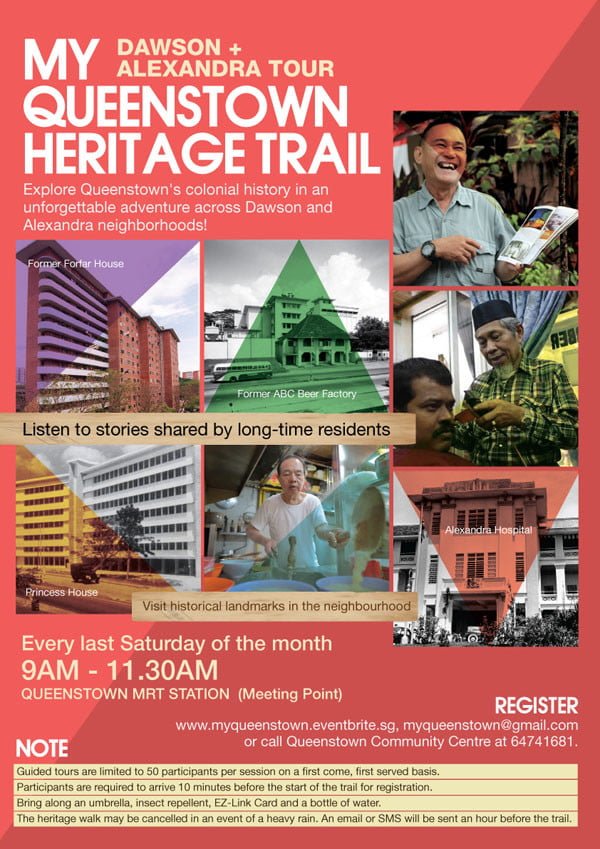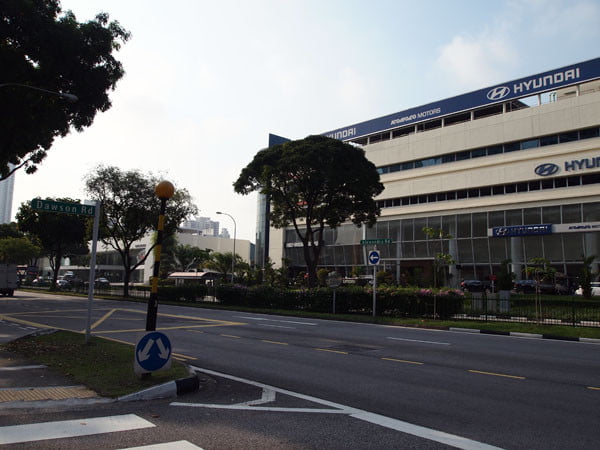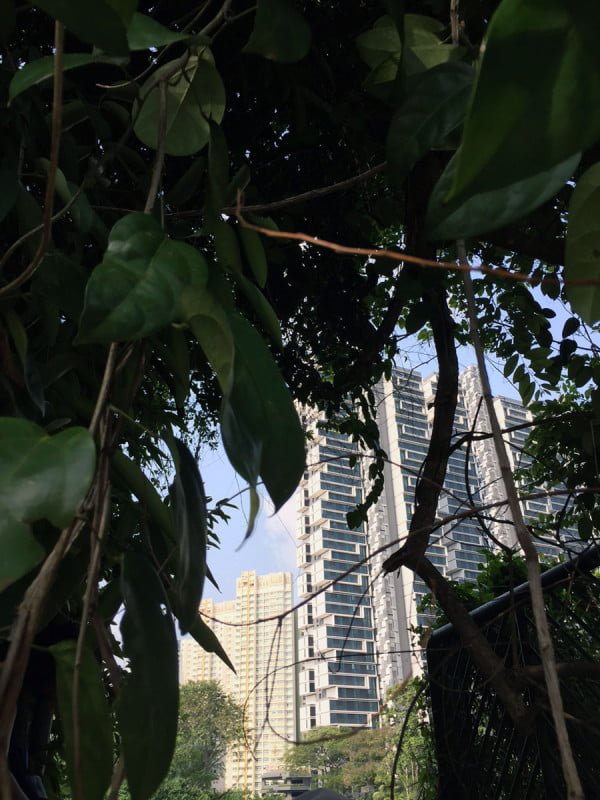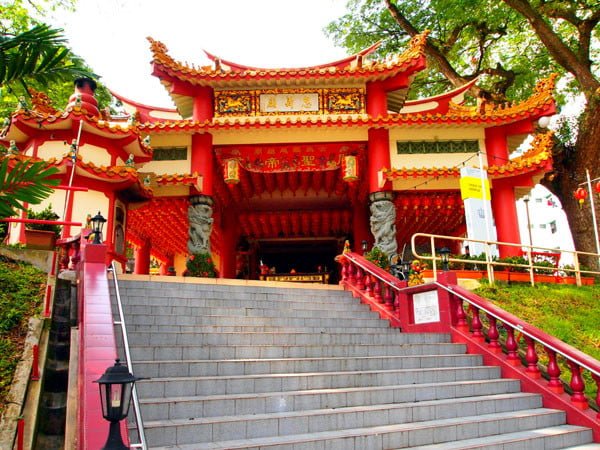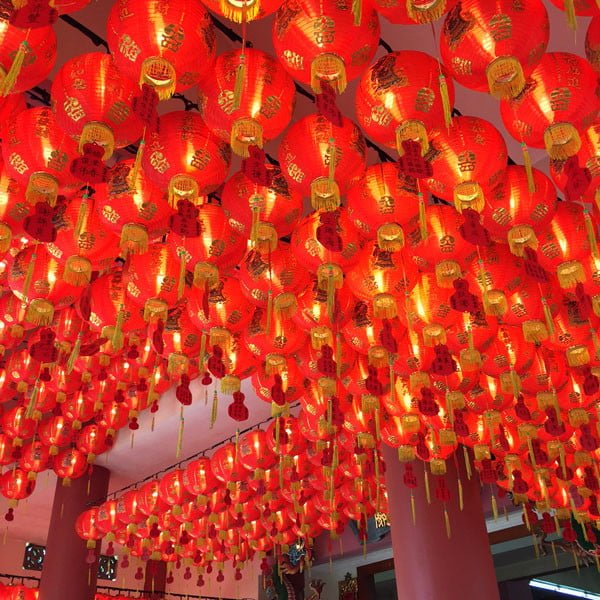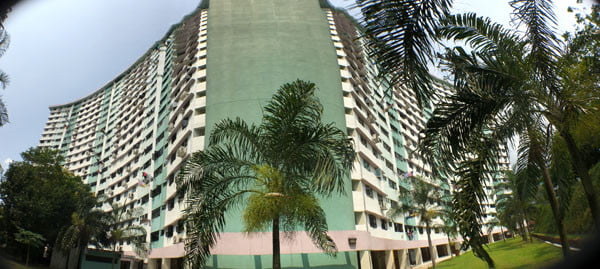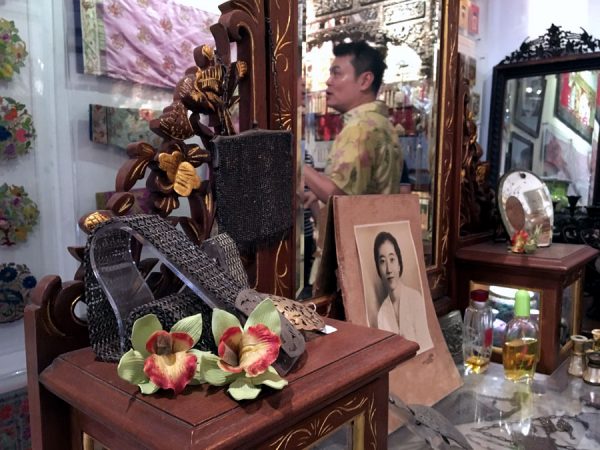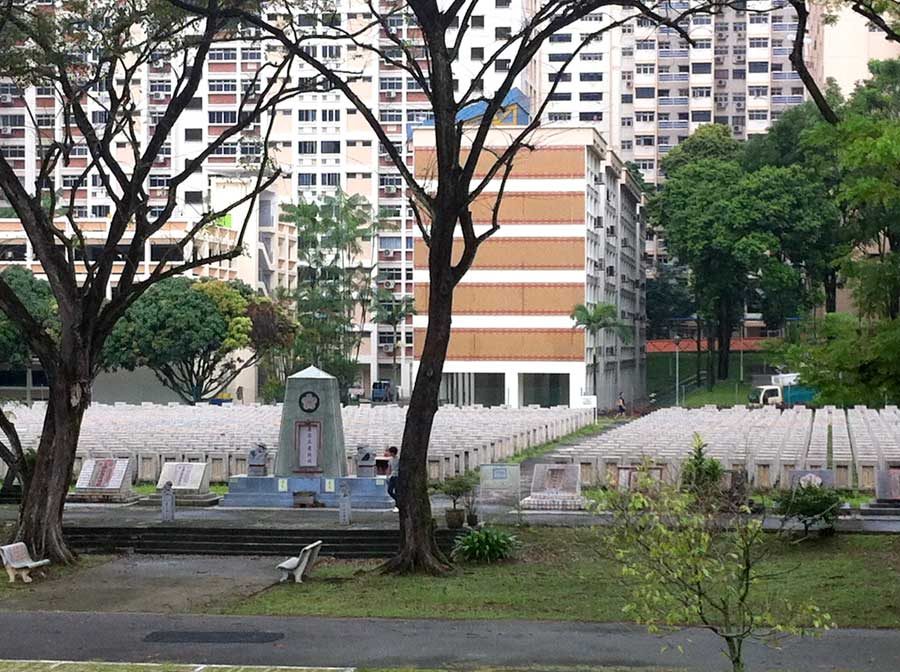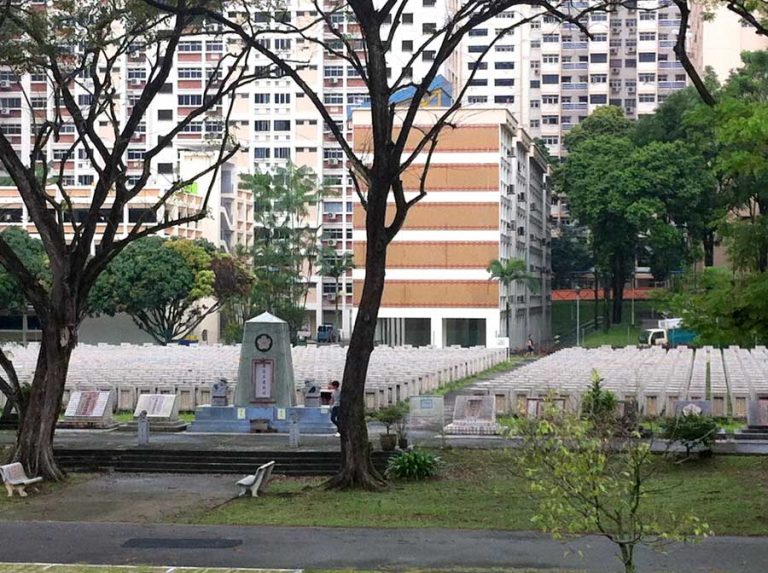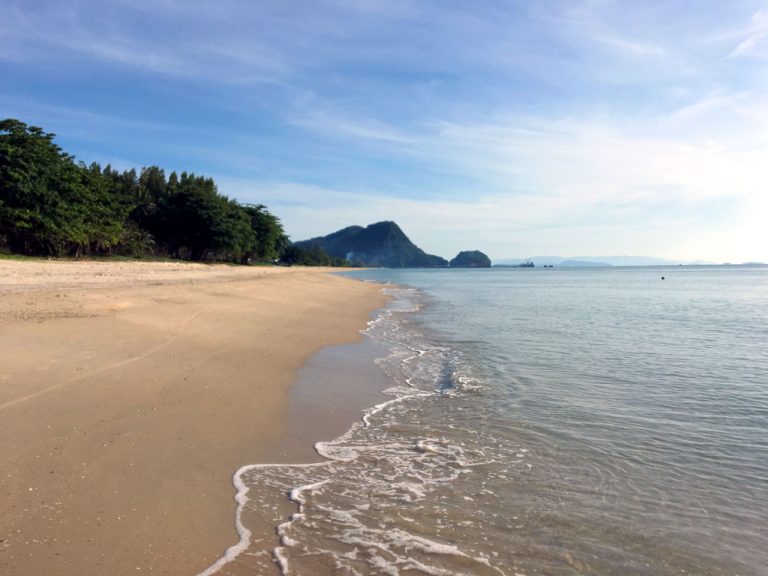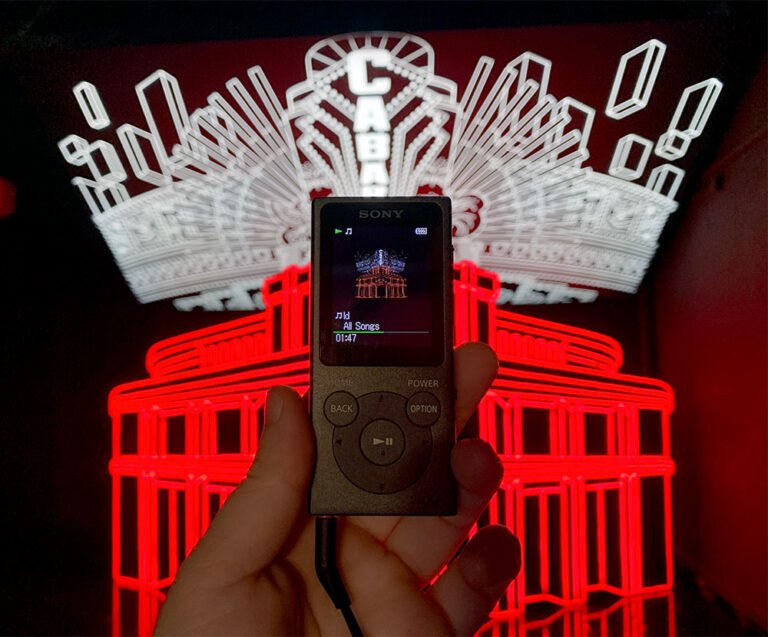The Dawson and Alexandra Heritage Trail – a walk through Singapore’s history
Last Updated on 5 July, 2024
Most tourists to Singapore don’t spend a lot of time here as we are a relatively small country and the main tourist highlights can be covered in a few days. However if you are looking to see a more local side of Singapore, venture into our residential neighbourhoods and you might be be surprised by the history hiding amidst the houses. Queenstown is one of the older neighbourhoods in the western side of Singapore and I was invited to walk the Dawson and Alexandra Heritage Trail and check out the unique history of their district – here’s what you can see along this walk.
I think these walking tours are great whether you are a tourist looking to get some local history or a Singaporean exploring your own backyard a little more. I was away during this particular event organized for the media, so I sent a good friend of mine to check out the launch of the Dawson and Alexandra Heritage Trail, which is also the neighbourhood she lived in for a long time so I thought she’d be able to add some local knowledge. Editing her account really made me wish I could have experienced the tour on my own as it is not an area I’m very familiar with. Small Singapore still surprises me with the number of new things I can find despite living here all of my life.
*Note: This article was originally posted in 2015 for the launch of the trail by My Queenstown. Since then, they have rebranded to My Community, separating Dawson and Alexandra into individual tours and added some new routes to their list. Learn more at the My Community website. In addition, I received a small honorarium for attending and writing about this event.
Pet:
Last weekend, J (Jac>> that’s Pet’s friend J and not me) and I spent our Saturday morning on the Dawson and Alexandra guided tour, jointly organised by My Community, The Other Sites of Singapore and Queenstown Citizens’ Consultative Committee.
Having spent a good half of my life growing up in Queenstown, I was pretty excited to take the tour. I must admit, I’ve become so accustomed to the scenery in my neighbourhood that it kind of blends into the background whenever I pass by. I was looking forward to revisiting these familiar sights and viewing them with new eyes.
We gathered at Queenstown MRT at 8.20 in the morning (J wilting a little at the early morning wake-up call). There, the organisers quickly distributed some handy dandy audio guides and earphones (like the kind you get in the museums in Europe) together with a nicely put together brochure detailing the places we would be later be visiting.
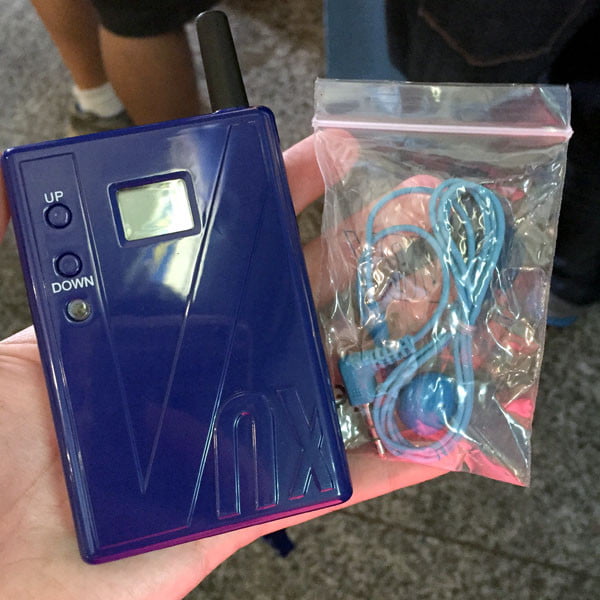
Former Forfar House
Our first stop was at the former Forfar House. What is now a towering 40-storey HDB flat used to be a modest 14-storey building in 1956, which was then the tallest residential building in Singapore, and earned the nickname “Chap Si Lau” (14th storey in Hokkien). Forfar House also broke ground in other ways, having modern sanitary systems and lifts that were not seen in Singapore in the 1950s.

According to our guide, being the tallest residential building in Singapore also had the unintended consequence of attracting some troubled people with suicidal tendencies. For the superstitious, this was chalked up to the building bearing the unlucky number 14 (which, in Chinese, means “sure die”. Apparently this is even worse than just the number 4!).
Princess House
Our next stop was Princess House, a 7-storey building along Commonwealth Avenue. Princess House was the first dedicated headquarters for the Housing Development Board (HDB), later becoming a multi-purpose building in 1957 which housed both government departments and offices open to the public.

As the headquarters for HDB, Princess House hosted several foreign dignitaries such as Prince Phillip, Princess Margaret (for whom the building and the entire former Princess Estate was named), and former UK Prime Minister Edward Heath.
Hock Lee bus riots starting point
En route to our next stop, we paused briefly at the seemingly unremarkable junction of Dawson Road and Alexandra Road, close to where the Hyundai building now stands. I must have driven past this spot more than a hundred times without realising that this was the starting point of the infamous Hock Lee bus riots, a major riot in Singapore during the 1950s (and one we all were made to read about in history class).
For those who didn’t study in Singapore (or fell asleep in history a lot like I did), on 23 April 1955, disgruntled bus drivers from Hock Lee Amalgamated Bus Company staged a peaceful demonstration at the bus depot located at the junction of Dawson Road and Alexandra Road to protest against their poor working conditions, long hours and low pay. Unfortunately, this turned violent when the riot police stepped in to break up the protests using water cannons and tear gas on 12 May 1955, leading to a riot which ended in the tragic death of two police officers.
Strathmore Estate
Turning in towards the Strathmore estate, our guide, Eu Chai, stopped to show us some pictures of the old HDB flats that used to line the streets. Now, massive blocks of HDBs dominate the skyline.

Kay Siang Road hidden barracks
A short walk along a gorgeous tree-lined road later, we reached what was definitely the highlight of the tour! This was the first stop that was truly new for me – the hidden barracks along Kay Siang Road. I must confess, it came as a real surprise that there were unexplored barracks tucked away so close to “civilisation”. (jac>> unfortunately, you might not be able to see this on your own as it is apparently located on private land…)
We scrambled through the fence with some help from Eu Chai, and the reason behind the ominous “thick vegetation” warning in our pre-tour email became immediately clear. We entered into a mini-forest of sorts, where the vegetation was indeed so dense that the ground was wet even though it hadn’t rained in a couple of days.
There was no marked path, so we followed the guide in single file and tried to keep from slipping on the wet leaves or getting smacked in the face by branches. If you are me and emit a supernatural beacon for all stinging, biting creatures (jac>> you should see her reaction to jellyfish stings when we go diving! Truly amazingly frightening.), you will also have the additional challenge of “not tripping over a tree root while walk-stomping on the ants and mosquitoes” to overcome.
(Bring repellent. I cannot stress this enough.)

Thankfully, the bunkers were only a short distance away. Oddly enough, to-date, no one has any idea why the bunkers were built at all. “Most likely storage bunkers during the war… but still, nobody really knows…” Eu Chai mused. *cue X-Files music*
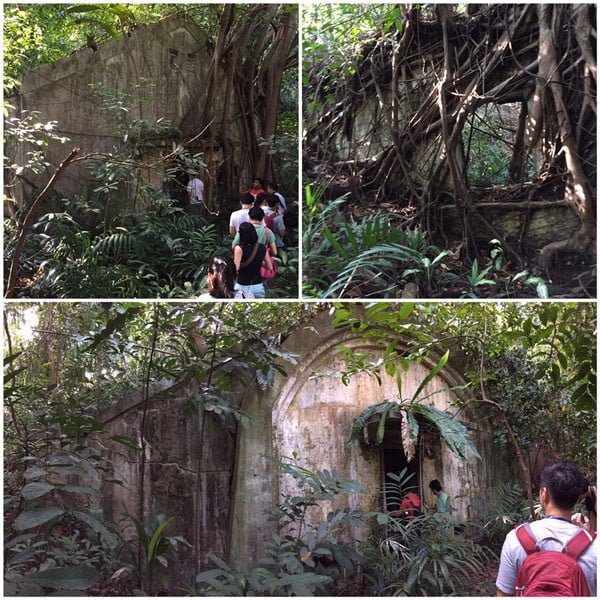
We could enter the second bunker, but while waiting my turn, I heard some faint screeches of “lizard!” emanating from inside, and wasn’t convinced that my trusty aerosol repellent could overcome that. There was also a third bunker further up, but the next group arrived and we got shooed out to make way for them :(
Emerging from the trail slightly scratched, sweaty and sticky, we were all pretty happy to see that the nice people organising the tour had mini buses and water waiting for us. We hopped in gratefully and were driven to our next stop.
Along the way, our guide Eu Chai, who grew up along Stirling Road, treated us to some trivia about Queenstown. Queenstown was the first satellite town created by the government, back when these things were pretty much experimental. Consequently, Queenstown is the only town in Singapore without a town centre. Unlike other towns in Singapore, Queenstown also doesn’t have very clear boundaries and it’s difficult to say exactly where it begins and ends.
Tiong Ghee Temple
We then alighted at Tiong Ghee Temple along Stirling Road. The temple is Queenstown’s oldest Taoist temple, although the temple that stands at the present site was only built in 1973. Prior to that, the temple stood where Mei Ling estate currently stands.
Butterfly Block
We then moved on to the Butterfly Block (Block 168A Queensway), so called because the twin curves of the blocks resemble a butterfly. This was one of the first curved-shape blocks constructed by HDB.
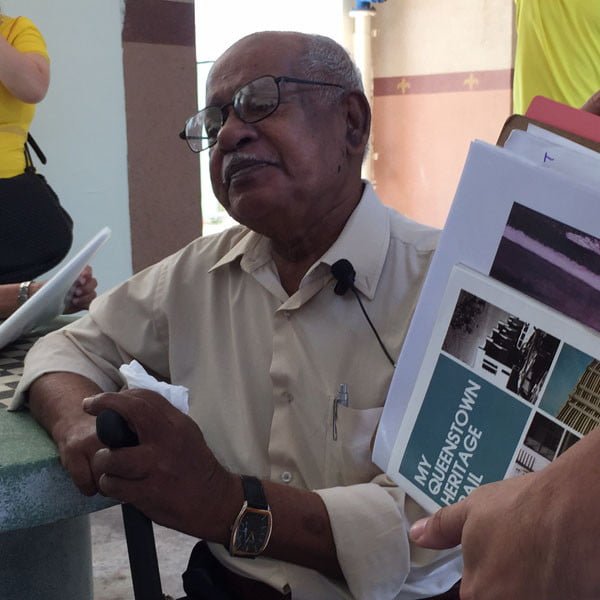
Queensway and Anchorpoint Shopping Centre
A short walk from the Butterfly Block brought us to Queensway Shopping Centre. Having always played one form of sports or another, this was definitely a familiar sight to me (I just went there yesterday, in fact).
Queensway Shopping Centre was built in 1974 and was one of Singapore’s first multi-purpose shopping complexes (the others are Golden Mile and Katong). Its distinct octagonal facade is thought to have links to fengshui practices (ba gua).
Just across the road from Queensway Shopping Centre stands Anchorpoint Shopping Centre. To my delight (and slight dismay), I learnt that that was where the former Archipelago Brewery Company used to stand. The site was chosen due to its close proximity to the old KTM railway tracks, providing convenient transportation links for the export of beer.
Our guide informed us that after the brewing took place at the main plant (where Anchorpoint now stands), bottled beer was then transported via a wooden overhead conveyor belt across the road to the canning line (where IKEA now stands). How awesome is that? Friends, for my next birthday, I would like a conveyor belt to bring freshly brewed beer to my house please.
Alexandra Hospital
Our last stop was the idyllic Alexandra Hospital. For those of you who have been there, I think you’d probably agree that the general feel of Alexandra Hospital is quite a far cry from the usual sterile atmosphere that people think of when they think of hospitals. The grounds are lush and green, and the entire thing looks more like a colonial-style resort rather than a hospital compound!
Unfortunately, Alexandra Hospital has had a rather brutal history. As a former military hospital, it was the target of an attack that has been described as “the largest and most awful massacre of British troops in World War II”. Within a short 30-minute span, more than 200 patients and personnel were killed by attacking Japanese platoons.
Today, the hospital still operates as a civilian hospital, and is affectionately known as the “Hospital in a Garden”. Interestingly enough, we were told at the end of our tour that an extensive network of tunnels exists under the hospital. Previously thought to be a means of escape from the hospital, the tunnels are now understood to be confined underneath the administrative block, suggesting that they were most likely used to get around within the hospital or for storage.
The Alexandra Hospital Tunnels don’t seem to be open to public usually, but look out for the Alexandra tours which may allow you access to these tunnels.
Alexandra Hospital marked the end of the tour, after which the mini buses popped up again and dropped us back at Queenstown MRT.
All in all, it was a thoroughly enjoyable morning out. I was reminded that despite having lived in Queenstown for a cumulative 15 years, there was still so much I didn’t know about the place. While I’m not sure how much interest this would hold for someone completely unfamiliar with the area, I definitely had a blast learning about the (admittedly brief) history of my ‘hood.
Check out details and dates of the free guided tours in Alexandra, Dawson and other areas nearby like Queenstown and Tiong Bahru at the My Community website.
Would love to hear any stories if you were/are a resident there now or just enjoying exploring the area! Do share in the comments. Here are other cool spots in Singapore to check out:

